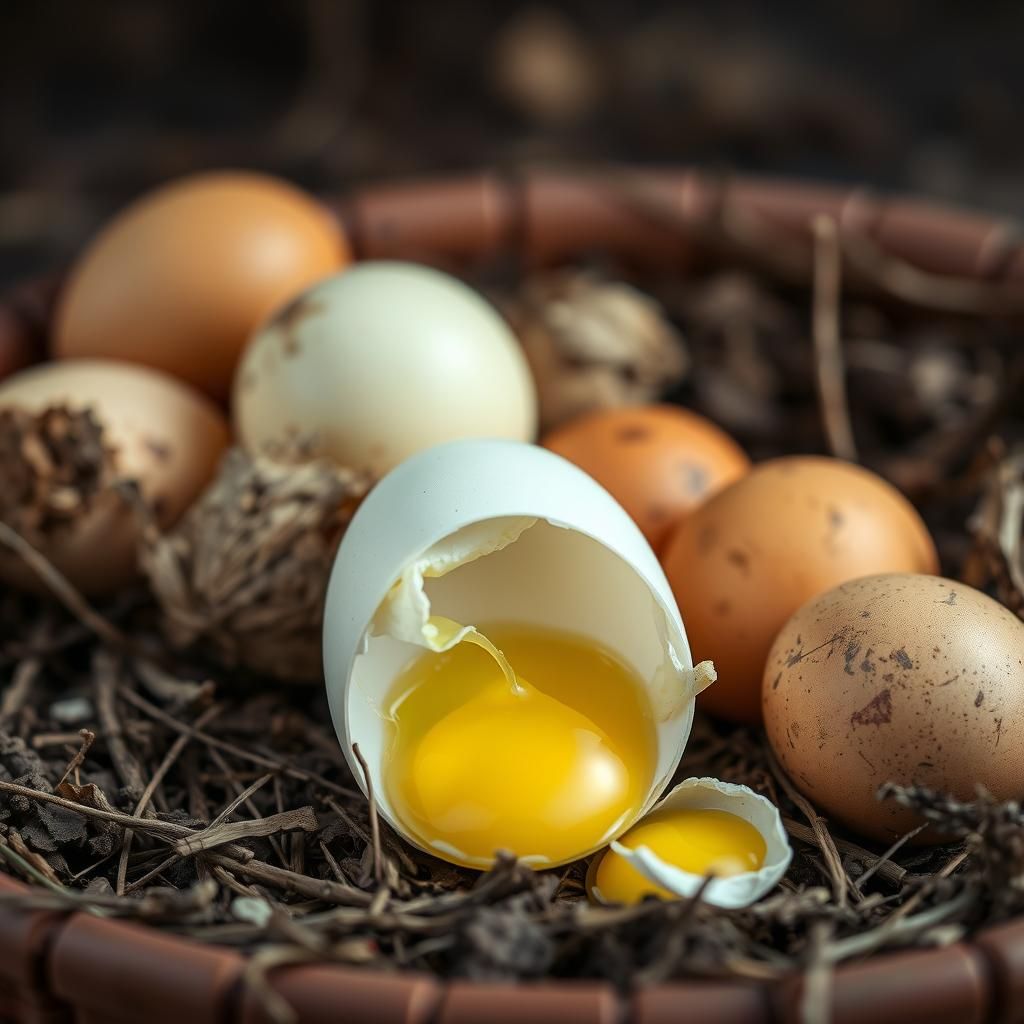Can I Put Rotten Eggs in Compost? Exploring the Benefits and Risks

Composting is a popular method for recycling organic waste, providing numerous benefits for gardens and the environment. However, not all organic materials are suitable for composting, and one question that often arises is whether rotten eggs can be included in the compost pile. This article will explore the potential benefits and risks of adding rotten eggs to your compost, examining how they can contribute to nutrient content, while also considering the potential for odor and pest issues. Understanding these factors will help you make informed decisions about what to include in your compost, promoting a healthy and effective composting process.
Can I Put Rotten Eggs in Compost?
Yes, you can put rotten eggs in compost, but it's essential to do so with caution. While eggs are a great source of nutrients that can enrich your compost, rotten eggs can pose some potential issues. The smell of decomposing eggs can be quite unpleasant, attracting pests such as flies and rodents. Additionally, if the eggs are excessively rotten, they may introduce pathogens into your compost pile. To mitigate these risks, it is advisable to bury the rotten eggs deep within the compost, ensuring they are well mixed with other materials to speed up decomposition and minimize odors.
Benefits of Adding Eggs to Compost
Adding eggs, even when rotten, can provide valuable nutrients like calcium and protein to your compost. These nutrients foster healthy microbial activity, which is crucial for effective decomposition. The presence of eggshells alone can improve soil structure by providing additional minerals. Therefore, while whole or slightly damaged eggs can be beneficial, rotten eggs should be used judiciously to balance nutrient input without introducing too many odorous elements.
Pests and Odors
One of the significant concerns about adding rotten eggs to compost is the potential for attracting pests. The strong smell of rotten eggs can invite flies, raccoons, and other scavengers to your compost pile, disrupting the natural balance. To reduce the risk of attracting unwanted visitors, consider enclosing your compost pile within a container or bin and ensure that you properly cover the eggs with a layer of brown materials such as dry leaves or straw to mask the odor.
How to Incorporate Rotten Eggs
If you decide to incorporate rotten eggs into your compost, it's best to chop them up into smaller pieces. This will aid in breaking down the egg more quickly and help to reduce odors. Mix the pieces thoroughly with other compostable materials, such as grass clippings and kitchen scraps. An ideal practice is to bury the chopped eggs in the center of the compost pile, where heat is typically higher, promoting quicker decomposition and minimizing any unpleasant smells.
Alternatives to Using Rotten Eggs
If you are concerned about the risks associated with using rotten eggs, there are plenty of alternatives that can provide similar benefits. Consider using egg shells instead, which can be crushed and added directly to the compost without the risk of odors or pests. Additionally, other protein-rich materials like shredded soybean meal or crushed bone meal can enrich your compost without the complications posed by rotten eggs.
Potential Risks of Using Rotten Eggs
The primary risks associated with adding rotten eggs to compost include the introduction of pathogens and the possibility of creating an unpleasant odor that may deter you from maintaining your compost pile. If not composted correctly, these pathogens could potentially infect your garden soil and plants. It’s vital to maintain the right balance of materials in your compost to ensure that the high nitrogen from the eggs is offset by the carbon-rich materials to keep the environment healthy.
| Aspect | Details |
|---|---|
| Nutrients | Rich in calcium and protein |
| Pest Risk | Attracts flies and rodents |
| Decomposition | Can be sped up by burying |
| Odor Issues | Strong smells can emerge |
| Health Risks | Potential introduction of pathogens |
Can you compost a rotten egg?


Composting is a popular method for converting organic waste into nutrient-rich soil. However, when it comes to composting certain items, caution is required. A rotten egg is not an ideal candidate for composting due to various factors, including odor, potential pathogens, and the effects on the composting process.
Odor Issues Associated with Rotten Eggs
Composting a rotten egg can lead to significant odor problems. The decomposition of eggs can release sulfur compounds that produce a foul smell, often likened to that of rotten cabbages. The strong aroma can deter people from maintaining a compost pile nearby, making it less inviting.
- Unpleasant smell: The strong odor can permeate the surrounding area.
- Composting environment: It may discourage other beneficial organisms from thriving.
- Neighborhood relations: It could potentially bother nearby residents.
Pathogen Concerns with Eggs
Another important factor to consider is the risk of pathogens. Rotten eggs can harbor bacteria such as Salmonella and Listeria, which can pose health risks. When added to compost, these pathogens can survive the composting process, especially if conditions are not ideal for heating.
- Bacterial survival: Some pathogens can survive in compost, leading to potential contamination.
- Health risks: Exposure to these pathogens can be dangerous to humans and pets.
- Composting effectiveness: Proper composting temperatures may not be achieved with rotten eggs present.
Impact on Compost Quality
Including a rotten egg in your compost can adversely affect the overall quality of the resulting compost. The high fat and protein content in eggs can attract unwanted pests, such as rodents, which can disrupt the composting process and lead to infestation.
- Compromise nutrient balance: The rotten egg can skew the nitrogen-carbon ratio in your compost.
- Pest attraction: It can draw pests to your compost pile, leading to more issues.
- Quality of output: The presence of rotten eggs may lower the overall quality of the finished compost.
Alternatives to Composting Rotten Eggs
Instead of composting, consider alternative disposal methods for your rotten eggs. There are safer and more effective ways to handle them without impacting your compost pile or the environment.
- Trash disposal: Seal rotten eggs in a bag and dispose of them in the trash.
- Pet food alternatives: Some animal feeds can incorporate expired eggs under safe conditions.
- Use in pest control: In some cases, rotten eggs can be used in traps for certain pests.
Proper Composting Practices
To maintain a healthy composting environment, it's essential to follow proper practices. This ensures that your compost is effective and safe for use in your garden without introducing unwanted materials like rotten eggs.
- Aeration: Regularly turn your compost to keep it aerated.
- Temperature control: Monitor temperatures to ensure efficient decomposition.
- Material selection: Focus on compostable materials like vegetable scraps, leaves, and yard waste.
Why can't you compost eggs?

Eggs are a common household item, often part of a balanced diet. However, when it comes to composting, many people wonder why they cannot simply add eggs or egg shells to their compost bins. Here are some detailed reasons:
See also:
Potential for Attracting Pests
One of the main reasons why you should avoid composting whole eggs is the potential for attracting pests and critters. When eggs are composted, they can release odors that are appealing to various animals.
- Rodents are especially drawn to the scent of eggs, which can lead to infestations in your compost bin.
- Cats and dogs might dig through your compost to find the eggs, leading to further mess and potential damage.
- Even larger animals like raccoons and opossums can be attracted to your compost pile because of the smell of rotting eggs.
Problematic Decomposition
The process of composting relies on a balance of nitrogen and carbon materials. Eggs can disrupt this balance because they do not decompose in the same way as traditional compost items.
- Whole eggs can take a long time to break down, creating unpleasant odors in the compost.
- The proteins in eggs can lead to a slimy texture, negatively affecting the overall compost quality.
- In some cases, eggs might actually rot instead of compost, producing a foul smell that can be counterproductive.
Pathogen Concerns
Raw eggs can potentially carry pathogens such as Salmonella. These pathogens can survive the composting process, posing health risks if the compost is used in gardens where food is grown.
- Salmonella can cause serious illness if ingested, making it crucial to minimize its presence in compost targeted for food production.
- Composting does not reach temperatures high enough to kill all pathogens effectively, especially in home composting setups.
- Using compost with potential pathogen contamination can risk food safety when gardening.
Odor Issues
Composting eggs can lead to significant odor issues, particularly as they break down. The smell can deter you from using the compost or even from maintaining your compost bin.
- As eggs decompose, they produce a strong and unpleasant odor that can permeate your outdoor space.
- Aromas from rotting eggs can also attract unwanted animals, compounding the problem of pests.
- Managing odors becomes a challenging task when eggs are part of the compost pile, often requiring more frequent maintenance.
Alternative Uses for Eggs
Instead of composting eggs, there are various alternative uses that can be more beneficial.
- Eggshells can be crushed and added to soil as a calcium supplement, helping to improve soil health.
- Cooking with eggs or making homemade dog treats can prevent waste and contribute to a balanced diet for pets.
- Recycling eggshells into crafts or natural pest deterrents can also provide creative uses outside of composting.
Questions from Our Readers
Can I put rotten eggs in compost?
Yes, you can put rotten eggs in compost, but it is recommended to do so in moderation. Eggs can add valuable nutrients to your compost pile, but too many rotten eggs can lead to unpleasant odors and attract pests.
What are the benefits of composting rotten eggs?
Composting rotten eggs can provide essential nitrogen to the compost, which is beneficial for the overall balance of materials. Additionally, they can help improve the microbial activity in the compost, promoting a healthier and more efficient composting process.
Are there any downsides to adding rotten eggs to compost?
One of the primary downsides of adding rotten eggs to compost is the potential for foul odors. If not managed properly, this can attract unwanted pests like flies and rodents, making it crucial to maintain a balanced compost mix when incorporating eggs.
See also:
How should I prepare rotten eggs before adding them to my compost?
Before adding rotten eggs to your compost, it's best to crack them open and mix them into the compost pile thoroughly. This helps to speed up the decomposition process and minimize any unpleasant odors, ensuring that they contribute positively to the overall composting system.

If you want to read more articles like Can I Put Rotten Eggs in Compost? Exploring the Benefits and Risks, we recommend you check out our Compost category.
Leave a Reply
Related Articles